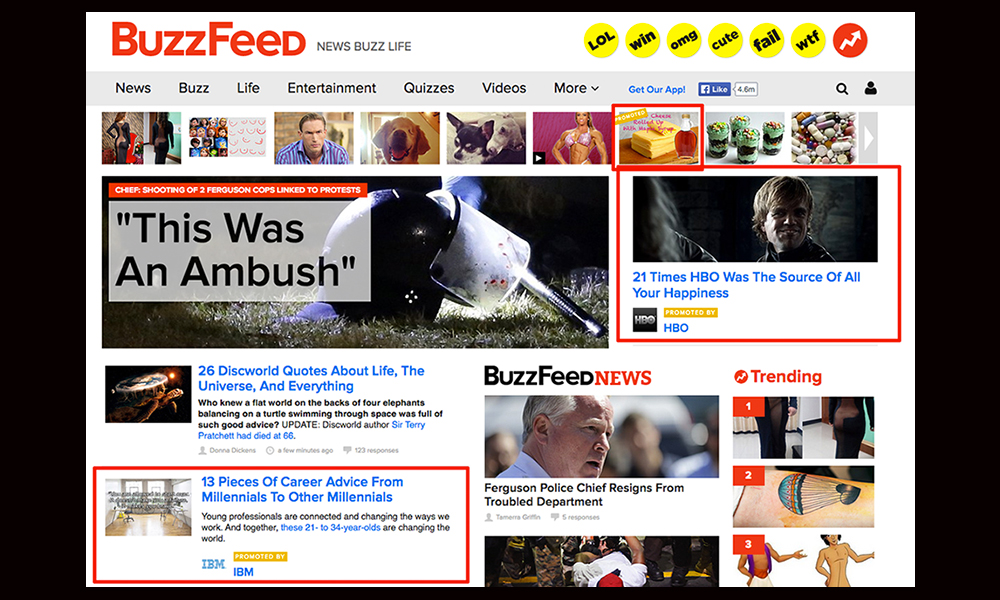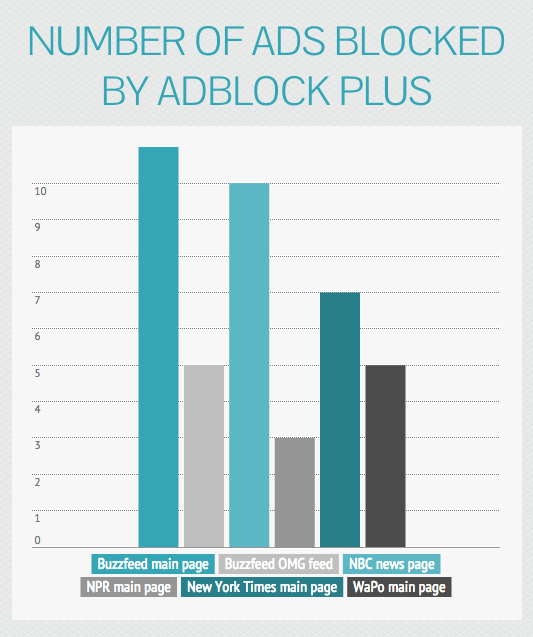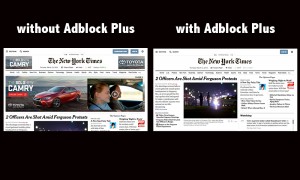
For a story I reported on the growing phenomenon of online ad blocking, I decided to try Adblock Plus, a free web browser plugin, to see how it affected my online experience. (See “Ad Blocking Poses Growing Challenge to Media Companies” for more about the trend.)
I expected differences on each site I visited, and was happy to see the program made it easy to quantify those differences with a tracker inset into the bottom of my browser, which tallied exactly how many advertisements it blocked on each web page I viewed.
After using the free tool for a few weeks, I decided to specifically sample results on a variety of news sites, including BuzzFeed, NPR, The Washington Post, NBCNews, The New York Times and others.
My findings were more interesting than I anticipated. The number of ads removed varied among media outlets, as I expected, but the different types of content it blocked surprised me. Beyond standard ad units, the software stopped sponsorships and donation requests, too.

After visiting six digital news pages and taking screenshots, I activated Adblock Plus and analyzed how many ads were removed
BuzzFeed: No Native Advertising
BuzzFeed surprised me the most.
A BuzzFeed spokesperson, Christina DiRusso, had told me the company doesn’t worry about ad blocking since the site doesn’t use traditional display or banner advertisements. But I found the filter stripped 11 ads from BuzzFeed’s home page, the most among web pages I visited that day.
Screen grab comparisons of BuzzFeed’s home page with Adblock Plus activated and not activated revealed that the plug-in removes BuzzFeed’s sponsored posts. Since these native ads are designed to look like regular news articles, one might expect them to bypass the ad filter. But I found the plug-in also blocked a listicle about HBO shows that was sponsored by HBO, and an article on career advice sponsored by IBM.
This suggests that while BuzzFeed may be getting creative and having success with native advertising forms, it may be paying a price when ad blockers intervene.
NPR: Donation Requests Stopped Cold
Since NPR is a non-profit not known for traditional advertising, it surprised me that Adblock Plus detected any ads on its website. Interestingly, it blocked five.
While NPR.org has no external advertisements, the ad blocking software still found work to do: On the homepage, Adblock Plus removed donation request links and promoted podcasts.
But since these links did not appear to be in violation of the guidelines Adblock Plus follows for ads it deems inoffensive or “acceptable,” NPR could petition Adblock to have its ads “whitelisted,” which would allow them to bypass the ad-blocking filter.
Other Sites: Routine Ad Blocking
All the other news sites I visited had standard display and banner ads, and Adblock Plus removed them all. On the New York Times site, Adblock Plus blocked seven ads, including a Camry advertisement that otherwise would have dominated the top of the page. Adblock Plus also removed five display and banner ads from washingtonpost.com. I looked more widely though other regional and specialty news sites and found more of the same: The filter blocked everything from standard ads to suggested (sponsored) posts.
At all the news sites I viewed, I struggled to find any ads that managed to get around the Adblock Plus filter. The closest example was a weather forecast “sponsored” by The Weather Channel on the NBC News homepage, but The Weather Channel is owned by the same parent company as NBC News, so it could be considered more of a content link than a commercial.
Is Ad Blocking Worth It?
Even though I know news sites depend on digital advertising revenue, I think I’ll continue to use Adblock Plus. I liked navigating homepages without having to mute videos. Viewing the print edition of The Washington Post, for instance, is easier when ads are stripped from the home page, causing the Today’s Paper link to rise all the way to the top, negating the need to scroll down two screens worth of commercial messages to reach it.
But—and this might give hope to news outlets — I found I was willing to turn off ad blocking when I had to choose between viewing something I liked or enjoying ad-free Internet browsing. Hulu offered a message that said I could only continue watching a TV show if I turned off Adblock Plus; I chose to keep watching, despite the annoyance of repetitive, long commercials jammed into my favorite TV shows.
If I ever visited nytimes.com and found a similar message alerting me that I had to deactivate Adblock Plus in order to read a big story, I probably would do so in order to access a story I valued.
So the adage about quality news luring loyal readers may be true—even though in the age of ad blocking, media companies may need to take extra steps to help readers stay loyal.







